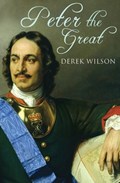There has never been a more remarkable national leader in modern history than Peter the Great (1672–1725). He was a giant in every way. In physical stature, willpower, enthusiasm, energy, libertinism, and refusal to accept old conventions, he stood head and shoulders above his contemporaries. He grew up in an atmosphere of fear, suspicion, and court rivalries that often assumed violent forms. He only gained power, at the age of seventeen, by ousting his half sister, Sophia, and shutting her up in a nunnery. As a product of the system, Peter was, of necessity, ruthless and tyrannical, personally carrying out the execution of defeated rebels and even effecting the death of his own son.
But there his identification with Russia's past ends. For what has earned Peter his place in history is his tearing his country, kicking and screaming, from its traditional, oriental customs and beliefs and integrating it into the life of Europe. He removed the privileges of the medieval aristocracy, brought the church under state control, and rejected the old Russian calendar in favor of the dating system used in Europe. He even ordered his courtiers and officials to shave their traditional beards and adopt Western dress codes. He avidly studied the latest scientific and technological advances and employed them to build a modern army and to create from scratch a Russian navy. These tools he used to devastating effect by destroying the Swedish Empire and making Russia (with its brand-new capital, St. Petersburg) master of the Baltic.
European leaders did not know what to make of this eccentric, unsophisticated tsar who loathed pomp and ceremony, served as a junior officer in his own armed forces, and indulged in rowdy, boorish behavior. Yet, by the end of his remarkable reign, this man, who had made a servant girl his own wife and empress, had married members of his family into the royal houses of Europe. Thanks to Peter the Great, Russia was profoundly changed. So was Europe.
Derek Wilson tells his extraordinary story with a verve and atmospheric detail that emphasizes vividly the impact this one man made not only in Russia, but in the wider world. Peter the Great created a new Europe in which, for good or ill, Russia was to play a crucial part. His contemporaries were obliged to come to terms with him. And today, it is perhaps even more important for us to understand the historical context and the pivotal role Peter played in the creation of a whole new order.

